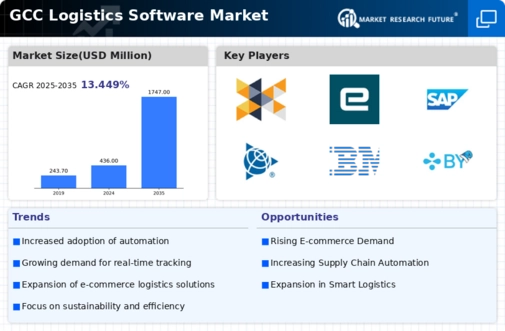Growing E-commerce Sector
The GCC logistics software market is experiencing a notable surge due to the rapid expansion of the e-commerce sector. With online retail sales projected to reach USD 28 billion by 2026, logistics software plays a crucial role in managing supply chains efficiently. Companies are increasingly adopting logistics solutions to streamline operations, enhance delivery speed, and improve customer satisfaction. The demand for real-time tracking and inventory management systems is particularly high, as businesses seek to optimize their logistics processes. This trend indicates a robust growth trajectory for the GCC logistics software market, as firms invest in technology to meet the evolving needs of consumers.
Adoption of Cloud-Based Solutions
The shift towards cloud-based logistics software solutions is transforming the GCC logistics software market. Businesses are increasingly opting for cloud technology due to its scalability, cost-effectiveness, and ease of integration. This trend is particularly relevant in the GCC region, where companies are looking to enhance their operational flexibility. Cloud-based solutions allow for real-time data access and collaboration among stakeholders, which is essential for efficient logistics management. As more organizations recognize the benefits of cloud technology, the GCC logistics software market is likely to witness a significant increase in the adoption of these solutions, driving innovation and competitiveness.
Government Initiatives and Investments
Government initiatives across the GCC region are significantly influencing the logistics software market. Various countries are investing heavily in infrastructure development, such as the UAE's Vision 2021 and Saudi Arabia's Vision 2030, which aim to enhance logistics capabilities. These initiatives are expected to create a favorable environment for logistics software adoption, as businesses seek to align with national goals. The logistics software market is likely to benefit from increased public-private partnerships, which could lead to innovative solutions and improved efficiency in supply chain management. As governments prioritize logistics as a key economic driver, the demand for advanced software solutions is anticipated to rise.
Rising Demand for Supply Chain Visibility
In the GCC logistics software market, there is a growing emphasis on supply chain visibility. Companies are increasingly recognizing the importance of transparency in their logistics operations, which is essential for effective decision-making. The demand for software that provides real-time data and analytics is on the rise, as businesses aim to enhance their operational efficiency. According to recent studies, organizations that implement visibility solutions can reduce logistics costs by up to 15%. This trend suggests that the GCC logistics software market will continue to evolve, with a focus on providing comprehensive visibility tools that cater to the needs of modern supply chains.
Focus on Data Analytics and AI Integration
The integration of data analytics and artificial intelligence (AI) into logistics software is becoming a key driver in the GCC logistics software market. Companies are leveraging advanced analytics to gain insights into their supply chain operations, enabling them to make informed decisions. The use of AI in logistics software can enhance predictive capabilities, optimize routes, and improve inventory management. As businesses strive for operational excellence, the demand for software that incorporates these technologies is expected to grow. This trend indicates a shift towards more intelligent logistics solutions within the GCC logistics software market, as organizations seek to harness the power of data for competitive advantage.























